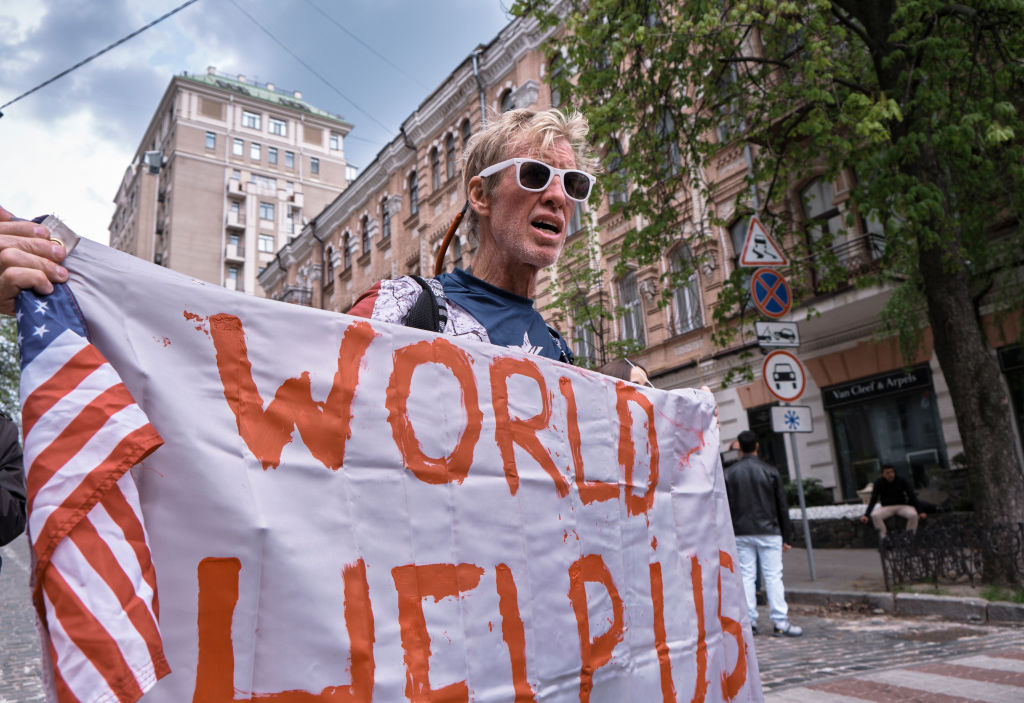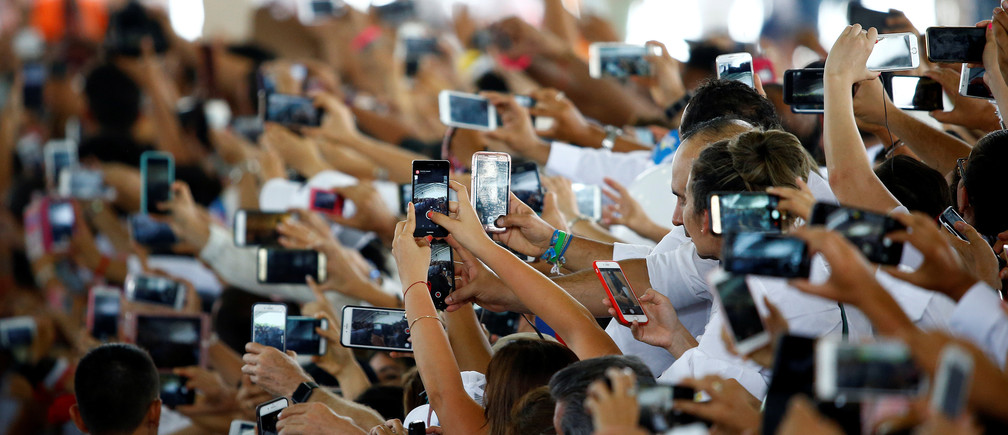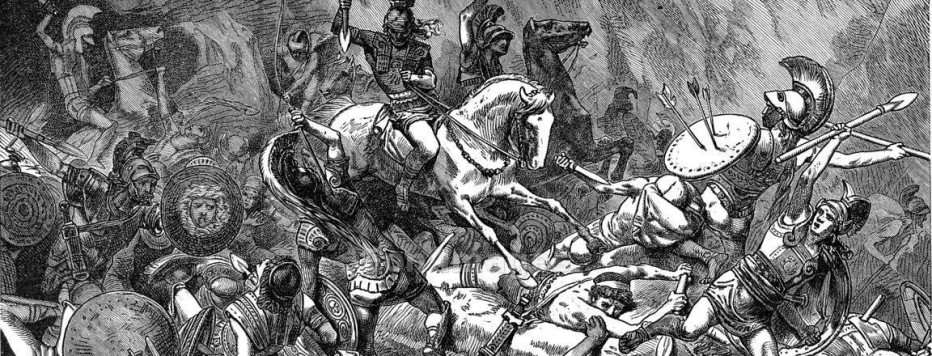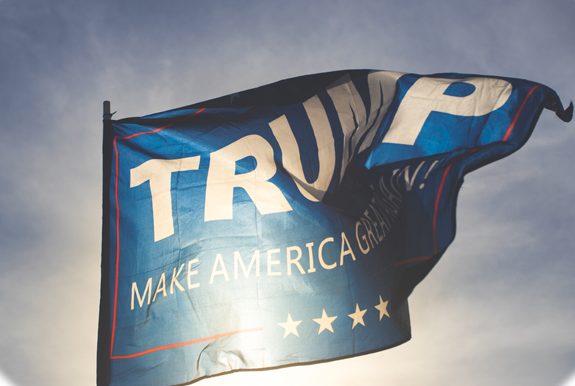Democracy and despotism in a digital age.
Ryan Routh and the War in Ukraine

The second Trump shooter believes in a dangerous and pervasive Western ideology.
The second would-be Trump assassin, Ryan Wesley Routh, is clearly an unhinged individual. But that does not mean his actions were irrational.
Following the entire U.S. political establishment, Routh believes that Donald Trump is the foremost threat to the current world order. Because of Trump’s refusal to treat international relations as a Manichean struggle, particularly in regard to the war in Ukraine, he violated the political narrative that every power-wielding institution in the West wholeheartedly believes in. An interview recorded by Newsweek Romania shows Routh explaining that the war “is black and white—this is about good vs. evil.”
He imbibed this narrative from the ruling class and their friends in the mainstream media, all of whom equate a second Trump administration with the fall of the transatlantic world order and the return of regional centers of power in Europe. According to their thinking, the 45th president is committed to destroying NATO and continues to be an ignorant pawn—if not a willing asset—of Vladimir Putin. Trump’s electoral victory would therefore be akin to the end of “democracy,” both at home and abroad.
One does not need to be an expert logician to see where this line of reasoning leads. If true, is it really worth leaving such an important decision to the ballot box, especially when so many Americans have expressed support for the former president, demonstrating that they are incapable of being responsible citizens?
Hating Trump because he might be an obstacle to the expansion of American empire is undoubtedly ideological. The U.S. foreign policy establishment operates according to a normative framework in which liberal democracy is the only legitimate form of government. Its actions and decisions are subsequently oriented toward promoting it—and at times outright facilitating regime change—through its vast constellation of foreign and domestic NGOs, intelligence assets, and political operatives.
The international press has subsequently interpreted Trump’s repeated proclamation that he will work with Russia and Ukraine to end the war as kowtowing to Moscow—“appeasement” à la Neville Chamberlain at Munich. Anything short of total Russian defeat serves to weaken the relative position of America and its European allies.
This line of reasoning is seriously flawed on multiple points. More honest if less ethical observers will note that U.S. support of a proxy war against Russia is a low-cost means of weakening a key geopolitical rival. As Lindsey Graham has stated, killing Russians is the best possible investment of American taxpayer dollars—even if the price tag includes an entire generation of Ukrainian men.
While it is true that the war is harming Russia’s economic position, both through sanctions and Moscow’s diversion of limited investment resources to military assets at the expense of developing other key sectors of its economy, this strategy has reached a point of diminishing returns. For one, Russia has effectively reoriented its economy by strengthening relations with countries outside the Western world. Additionally, attempts to strangle the Russian economy are not threatening the Putin regime’s stability. Instead, there appears to be a hardening of public resolve among Russians in the face of continuing pressure from the West.
In fact, Western policies against Russia are even starting to have an inverse effect. It is now the U.S.-led transatlantic alliance that is emptying its weapons and equipment stocks to keep Ukraine afloat. The limits of our defense base have also been exposed, which won’t be rectified anytime soon.
The only actors seeing a concrete benefit from the West’s current approach to Ukraine are U.S. defense contractors, other MIC-related interest groups, and establishment pundits who make the media rounds advancing their own delusions as “expert” analysis. This is a lucrative business. Ending forever wars means ending this gravy train, so those who are responsible for charting U.S. foreign policy have a vested interest in ensuring that the American empire stays intact.
It is no coincidence that noticing the above is met with accusations of using “Russian talking points.” Restraint and realism are branded as “isolationism.” And anyone who does not support endless war in service of spreading a prescribed set of social values and free market economics to every corner of the world is an agent of disinformation.
How did the mainstream foreign policy views of American Founders like George Washington, who opposed entangling alliances, become un-American and unpatriotic?
It is because that older framework is a direct threat to the entrenched forces that currently make their living from the status quo. Their personal interest is the antithesis of any actual U.S. national interest, as far as it can be defined by something like a reduced overseas foreign posture in favor of a focus on America’s domestic situation.
In accordance with such domestic considerations, America must adapt its foreign policy in order to account for shifting realities in international relations. Not only has our intervention-focused approach over the past three decades failed to achieve its desired outcomes in social and political terms, but it is simply no longer viable based on the relative control of natural and economic international resources. U.S. primacy is ending. This is due as much to the inertia of geopolitical forces as to the incompetence of our policymakers, who will ensure that the U.S. finds itself in a much weaker position in any subsequent international order.
The American political class squandered its position after the Cold War—and the blood and treasure spent to ensure that position—on ideological escapades and short-sighted economic projects that have enriched a narrow political class as the expense of the American nation.
For those like Yuval Noah Harari, a Russian “victory”—which is anything less than the total expulsion of its armed forces from the territory they currently hold and the ouster of the Putin regime—would initiate a “new era of imperialist wars of conquest.” According to this logic, the stability and spread of the neoliberal empire is the responsibility of any person or institution with the requisite power (in this case, the U.S.’s political establishment). Thus a “national interest” is only legitimate as far as it serves the just cause of all humanity.
Contrary to this view, a realist approach to Ukraine would include an honest appraisal of what can be done and what cannot be done based on viewing the balance of forces in the theater, industrial and economic capacities, and national security considerations of each side.
Such an analysis would make it clear that Kiev cannot achieve its stated political objectives lest its Western allies expand their involvement in the fight. Acknowledging this reality would create the opportunity to save many lives—but it would also close the door on further profits for very powerful interests.
All of this is why the foreign policy establishment views Donald Trump and J.D. Vance as such a threat.
Vance has been at the forefront of identifying the corrupt financial interests lurking just below the paper mâché veneer of “Defending Democracy” in Ukraine. He introduced the Ukraine Aid Transparency Act of 2024 back in March, which would have provided oversight and tracked weapons and aid flowing into the country. Unsurprisingly, this elicited a great gnashing of teeth in the halls of D.C. Fawning Democrats who had waved Ukrainian flags upon sending yet another $60 billion of taxpayer money to a failing war effort thought it a step too far to demand accountability for the money and weapons pouring into one of the most politically corrupt nations on the planet.
Given the charged environment around U.S. national security and the war in Ukraine, Routh’s attempted assassination of Trump came at a particularly interesting time. Currently, there is much discussion about the U.S. lifting all restrictions on Ukraine’s ability to use Western-supplied weapons to strike targets deep inside of Russia. This makes the prospect of escalation very relevant.
The U.S.’s expansive role in Ukraine includes the volume of equipment and weaponry we’re supplying, as well as the offensive capabilities and logistical and operational support. But the U.S. does not simply provide the technological means: Washington now admits it is directly involved in targeting Russian military assets for Kiev. This makes it increasingly difficult to argue that the U.S. and its European allies are not direct participants in the fight. From Javelins to HIMARS to M1 Abrams tanks to ATACMS to F-16s—the spiral of escalation has continued despite the delivery of each tranche of provisions largely coinciding with the steadily deteriorating position of Ukraine’s armed forces.
The steady climb up each wrung of the ladder of escalation—potentially even to the point of deploying foreign troops—is the strategy of an industrially inferior population. Those who argue that Russia is bluffing about maintaining escalation dominance on its border are the same people who have never seen a war they didn’t like. The worse the international security environment—the more weapons purchases and new sinecures available to reward loyal liberal internationalists—the better it is for the war class. They have no qualms about lighting a conflagration the world over—after all, it certainly won’t be them doing the fighting.
Routh was a useful idiot to those spinning this web. His Harry Potter vs. Voldemort worldview is appealing, as it neatly cuts the world in half—there’s a clear wrong side and right side of History. “The world is united…we all move forward as one collective whole unit. Russia does not grasp this concept,” Routh stated. There is no room for compromise, and thus no place for diplomacy in this two-dimensional understanding of world affairs.
The ideological framework Routh believes in has been erected upon a foundation of raw interest—financial, political, and social. Undermining that foundation requires a wrecking ball. The entrenched apparatchiks of the foreign policy establishment—in government, business, media, academia, and the non-profit world—fear that a Trump-Vance Administration will be just that. They have therefore presented this possibility as the single greatest threat to the current order, knowing full well that they are simply attempting to keep their own positions secure atop an artificially constructed hierarchy.
Depending on what happens come November, we may find out whether or not they are correct.
The American Mind presents a range of perspectives. Views are writers’ own and do not necessarily represent those of The Claremont Institute.
The American Mind is a publication of the Claremont Institute, a non-profit 501(c)(3) organization, dedicated to restoring the principles of the American Founding to their rightful, preeminent authority in our national life. Interested in supporting our work? Gifts to the Claremont Institute are tax-deductible.
In 2010, Claremont Institute Senior Fellow Angelo Codevilla reintroduced the notion of "the ruling class" back into American popular discourse. In 2017, he described contemporary American politics as a "cold civil war." Now he applies the "logic of revolution" to our current political scene.
Claremont Institute Senior Fellow John Marini is one of the few experts on American Government who understood the rise of Trump from the beginning of the 2016 election cycle. Now he looks to the fundamental question that Trump's presidency raises: is the legitimacy of our political system based on the authority of the American people and the American nation-state, or the authority of experts and their technical knowledge in the service of "progress"?




